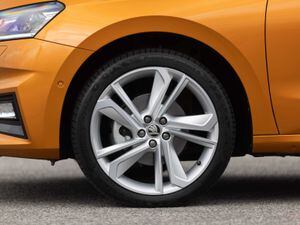More than a third of motorists driving with damaged alloy wheels
Research suggests over half of this damage was caused by kerbs.

New research suggests more than a third of motorists are driving vehicles with damaged alloy wheels.
Furthermore, about 56 per cent of those damaged wheels came from hitting kerbs, meaning there are 13 million kerbed alloys on UK roads that would cost more than £890 million to fix.
The research from 2,000 motorists by Skoda UK came to this conclusion based on the average price of fixing a damaged wheel being £67.50, which came from the average of 10 quotes from wheel repair businesses.

Further analysis shows that most UK drivers only have themselves to blame for any repairs, with 83 per cent saying the damage was caused by someone in their own household.
Despite such a high number of kerbed wheels, a third of drivers claimed to be very confident when parking, while a similar number admitted to hitting another vehicle or object while pulling up.
Pulling into a designated bay is seen as preferable, with 45 per cent saying they would rather park this way than any other, compared with just 18 per cent for parallel parking.
The problem with damaged alloy wheels is not just an aesthetic one. Hitting the kerb can cause damage to the tyre, increasing the chances of a blowout. Furthermore, it can knock the car’s tracking out, which can lead to uneven tyre wear or steering wheel vibrations.
Anyone who has hit a kerb, pothole or similar should either inspect the tyre themselves or take the vehicle to a specialist garage. Similarly, any vibrations felt through the wheel should be investigated by professionals.
As for cosmetic damage to the wheels, this is generally not an immediate safety issue, and can usually be repaired by specialist firms.





